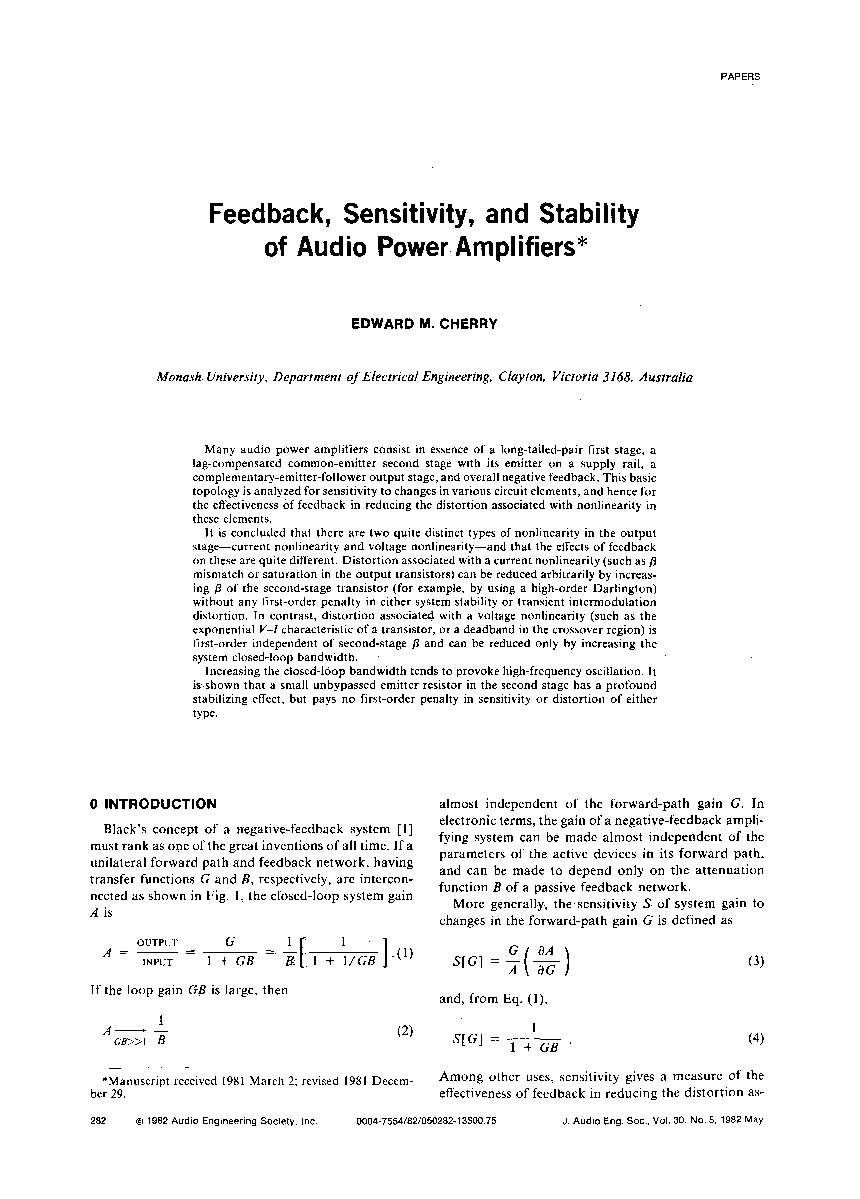Home / Publications / E-library page
You are currently logged in as an
Institutional Subscriber.
If you would like to logout,
please click on the button below.
Home / Publications / E-library page
Only AES members and Institutional Journal Subscribers can download
Many audio power amplifiers consist in essence of a long-tailed-pair first stage, a lag-compensated common-emitter second stage with its emitter on a supply rail, a complementary-emitter-follower output stage, and overall negative feedback. This basic topology is analyzed for sensitivity to changes in various circuit elements, and hence for the effectiveness of feedback in reducing the distortion associated with nonlinearity in these elements. It is concluded that there are two quite distinct types of nonlinearity in the output stage-current nonlinearity and voltage nonlinearity-and that the effects of feedback on these are quite different. Distortion associated with a current nonlinearity (such as ß mismatch or saturation in the output transistors) can be reduced arbitrarily by increasing ß of the second-stage transistor (for example, by using a high-order Darlington) without any first-order penalty in either system stability or transient intermodulation distortion. In contrast, distortion associated with a voltage nonlinearity (such as the exponential V-1 characteristic of a transistor, or a deadband in the crossover region) is first-order independent of second-stage ß and can be reduced only by increasing the system closed-loop bandwidth. Increasing the closed-loop bandwidth tends to provoke high-frequency oscillation. It is shown that a small unbypassed emitter resistor in the second stage has a profound stabilizing effect, but pays no first-order penalty in sensitivity or distortion of either type.
Author (s): Cherry, Edward M.
Affiliation:
Monash University, Department of Electrical Engineering, Clayton, Victoria 3168, Australia
(See document for exact affiliation information.)
Publication Date:
1982-05-06
Import into BibTeX
Permalink: https://aes2.org/publications/elibrary-page/?id=3844
(1334KB)
Click to purchase paper as a non-member or login as an AES member. If your company or school subscribes to the E-Library then switch to the institutional version. If you are not an AES member Join the AES. If you need to check your member status, login to the Member Portal.

Cherry, Edward M.; 1982; Feedback, Sensitivity and Stability of Audio Power Amplifiers [PDF]; Monash University, Department of Electrical Engineering, Clayton, Victoria 3168, Australia; Paper ; Available from: https://aes2.org/publications/elibrary-page/?id=3844
Cherry, Edward M.; Feedback, Sensitivity and Stability of Audio Power Amplifiers [PDF]; Monash University, Department of Electrical Engineering, Clayton, Victoria 3168, Australia; Paper ; 1982 Available: https://aes2.org/publications/elibrary-page/?id=3844